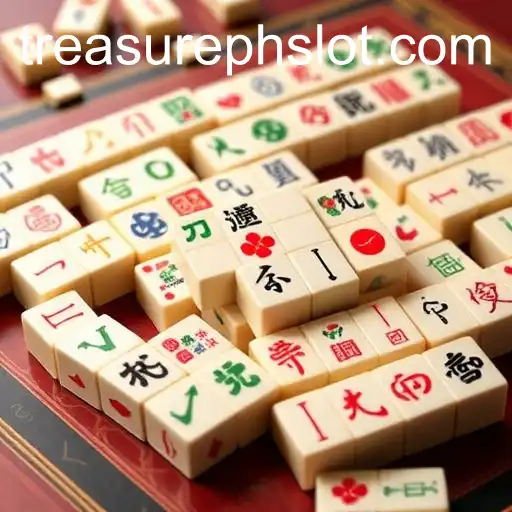
TREASUREPH - The Fascinating World of Mahjong: A Cultural Treasure
Explore the rich history and intricate gameplay of Mahjong, an iconic game with deep roots in Chinese culture. Discover the strategic depth and social significance that make Mahjong a beloved pastime across the globe.

The Fascinating World of Mahjong: A Cultural Treasure
Introduction to Mahjong
Mahjong is a mesmerizing tile-based game originating from China, weaving an alluring tapestry of tradition, skill, and chance. With its rich history steeped in cultural nuances, Mahjong stands as more than just a game—it's a cultural TREASUREPH that echoes the history and communal aspects of Chinese society. As this game transcends borders, it captures the imagination of players around the globe, making it an integral part of strategic and social interactions.
The Origins of Mahjong
The origins of Mahjong are shrouded in mystery, with various legends tracing its beginnings. One story suggests that the game was created by Confucius, the esteemed philosopher, in 500 BC. However, historical evidence points to its development during the Qing dynasty in the mid-to-late 1800s. Whatever the true origin, Mahjong quickly gained popularity, evolving from being a recreational activity for the elite to a pastime enjoyed by people from all walks of life.
The Structure and Rules of Mahjong
Mahjong is generally played with a set of 144 tiles based on Chinese characters and symbols, although regional variations exist. These tiles are divided into three suits—bamboo, characters, and dots—with additional honor and bonus tiles. The objective of the game is simple yet challenging; players compete to build complete sets of tiles to form a winning hand.
The Basic Gameplay
A typical game of Mahjong involves four players. Each player starts with a hand of 13 tiles. Players draw and discard tiles in turns, aiming to form a complete hand of four sets and a pair. The sets can be either 'pungs' (a set of three identical tiles), 'chows' (a sequence of three consecutive numbers in the same suit), or 'kongs' (a set of four identical tiles). The first player to form a complete hand and declare 'Mahjong' wins the round.
Strategy and Skill
While the element of luck plays a role in Mahjong, the game requires immense strategy and skill. Players must be adept in calculating odds, anticipating opponents' moves, and quickly adapting to changing situations. Mastery of Mahjong involves not just memorizing tile combinations but also understanding opponents' tendencies and strategizing accordingly.
Mahjong's Social and Cultural Significance
Mahjong's intense strategy aside, its true essence lies in the social bonds it fosters. In Chinese culture, Mahjong is an important social activity, a communal experience that strengthens family ties and camaraderie among friends. Frequently played at family gatherings and festivals, Mahjong sessions often stretch for hours, filled with laughter, chatter, and the occasional friendly banter.
Global Appeal
With the rise of globalization, Mahjong has transcended its cultural roots to become a beloved game worldwide. Countries like Japan, Korea, and the United States have embraced the game, each adding nuanced variations to the rules. The recent surge in online gaming platforms has further spread Mahjong's charm, allowing players to connect and strategize with enthusiasts around the globe.
Technological Influence and Online Platforms
The digital age has brought Mahjong to a larger audience through numerous online platforms. These platforms replicate the tactile experience of playing with physical tiles while providing the convenience of digital play from any location. Many dedicate themselves to learning and mastering Mahjong strategies online, competing with international players in various tournaments.
The Popularity of Mahjong Tournaments
Tournaments are an integral aspect of the Mahjong experience, showcasing not only individual mastery but also the game's dynamic nature. Prestigious tournaments attract players of all levels, offering a stage where a mix of strategizing, tension, and triumph unfolds. The World Mahjong Organization and similar entities cultivate a competitive environment where players chase titles and, sometimes, substantial monetary rewards.
Conclusion
Mahjong, steeped in tradition and strategy, serves as a cultural TREASUREPH, capturing both the mathematical intellect and social cordiality of its players. Its complex blend of skill, chance, and social interaction contributes to its allure, making it more than just a pastime. As Mahjong continues to grow globally, it continually adapts, proving its timeless appeal and rich cultural significance.
Final Thoughts
The magic of Mahjong lies in its balance between strategy, chance, and social interaction. As enthusiasts gather around the table or a virtual platform, they partake in a time-honored tradition that transcends language and culture, further solidifying Mahjong's place as a global pastime.


GOLD VIP
Minimum deposit: ₱1,500
- ✅ 150% bonus on all deposits
- ✅ Priority withdrawal in 1 minute
- ✅ 10% cashback weekly
- ✅ VIP support 24/7
- ✅ Higher betting limits
PLATINUM VIP
Minimum deposit: ₱6,000
- ✅ 200% bonus + all Gold benefits
- ✅ Instant withdrawal 24/7
- ✅ 15% cashback weekly
- ✅ Exclusive VIP table in casino
- ✅ Special event invitations
DIAMOND VIP
Minimum deposit: ₱30,000
- ✅ 300% bonus + all previous benefits
- ✅ Dedicated personal manager
- ✅ 20% cashback weekly
- ✅ Unlimited withdrawal limits
- ✅ Exclusive trips and gifts
🚀 Register NOW and Get ₱15,000 Bonus!
⏰ LIMITED TIME OFFER! Join over 1.2 million players who have already discovered why TREASUREPH is the #1 betting platform in the Philippines. Registration in 30 seconds, first withdrawal in 2 minutes!
💬 What our players say
"Best platform I've ever used! GCash withdrawal in 2 minutes, amazing support!"
- Carlos M., Manila ⭐⭐⭐⭐⭐
"Won ₱45,000 on Gates of Olympus! They paid everything correctly via GCash."
- Ana L., Cebu ⭐⭐⭐⭐⭐
"VIP system is amazing! I have a personal manager and cashback every week."
- Roberto S., Davao ⭐⭐⭐⭐⭐
PAGCOR License
SSL 256-bit
eCOGRA
BSP Approved





